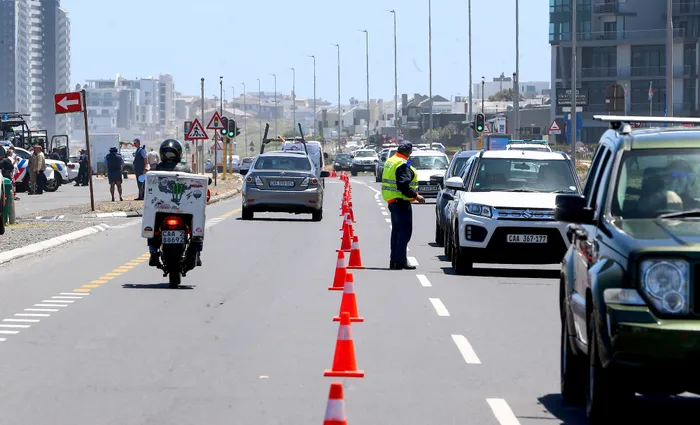
With the Easter holiday rush fast approaching, South Africa is mobilising multiple organisations to enhance road safety and avert tragedies.
Image: Leon Lestrade/Independent Newspapers
TRAFFIC officers will be deployed on the country’s major routes on a 24-hour basis with regular stops and checking of vehicles over the Easter long weekend.
A significant spike in traffic volumes is expected Thursday and Friday.
“Wear your seat belts, reduce speed, buckle up babies and children, don’t text while driving, instead use your hands-free kit and your voice to give instructions to your phone,” Transport Minister Barbara Creecy advised motorists.
“We have a pandemic of brain injuries of young children in our country caused by the impact of motor vehicle accidents. Babies don’t belong in your arms, they belong in a baby seat and children also belong in a special seat and must be strapped in.”
Creecy said that the Eastern Cape, Gauteng, KwaZulu-Natal, Western Cape, and Limpopo provinces account for more than 76% of road accidents and deaths.
“80% of accidents in our country are caused by human error, such as speeding, texting while driving, fatigue, driving under the influence of alcohol, walking on highways and across highways both as sober and not so-sober pedestrians — all of these are major factors in road accidents,” she said.
She added that most of the serious accidents and fatalities occur on Friday nights and Saturday nights, particularly between the times of 6pm and 8pm.
Creecy said there will be increased police visibility, particularly late at night and in the early hours of the morning, when recklessness and driver misbehaviour are most prevalent.
“We urge motorists to plan routes carefully, especially considering that unfortunately we are expecting heavy rainfall throughout the Easter weekend, and we know that heavy rainfall is an important factor in promoting more road accidents,” she said.
Simon Zwane, spokesperson for the Road Traffic Management Corporation (RTMC) said there will be heightened monitoring of traffic movement and operations at toll gates and interventions will be made when the situation calls for them to avoid congestion and ensure smooth traffic flow.
“We will be conducting joint law enforcement operations with the SAPS, provincial and municipal authorities to deal with issues such as drunk driving, speeding, and the roadworthiness of vehicles. Jointly, we will be maintaining high visibility on the routes to deal with rogue driver behaviour and to remove pedestrians from the roads,” Zwane said.
Zwane added that some filling stations on major routes have allowed RTMC to use their rest stops for long-distance drivers to take a break.
Mmatshikhidi Rebecca Phala, national spokesperson for the South African National Taxi Council (Santaco) said taxi patrollers will be visible countrywide working closely with law enforcement to oversee safe driving conditions by all taxi drivers, oversee road stoppages and compliance by taxis, drivers, and commuters.
“Much more heightened work will be on the N1 and R101 in Limpopo because the ZCC churches will be having their Easter pilgrimages after the closures dating back to Covid-19 lockdown times which effectively means traffic volumes will be increased,” Phala said.
She added that Santaco has been visiting long-distance and cross-border operations taxi ranks checking for vehicle compliance and removing any vehicle found with errors including outdated licensing documentation, smooth tyres, and missed vehicle maintenance and/or servicing.
“The directive is that long-distance taxi marshals will not allow commuters to load too much luggage because that is one of the core causes of overloading in our taxis. In some of our long-distance taxi ranks, operators have decided to use trailers to ensure enough packing of luggage so commuters sit comfortably and are not submerged by heavy luggage."
Cape Times
Related Topics:
